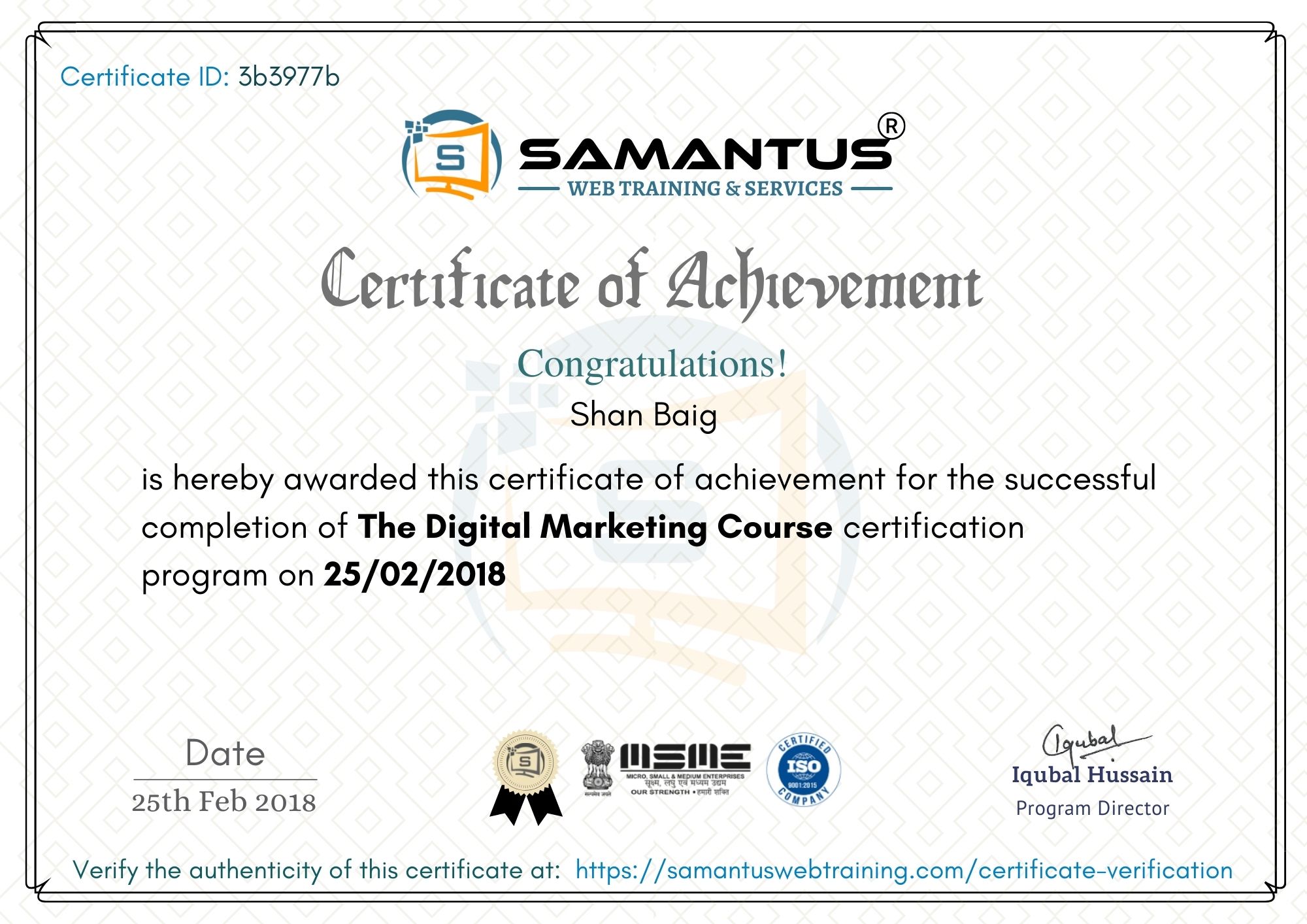A Complete Guide to MySql Course in Kerala
A Whole Guide to MySQL Course: Learn skills that are in demand and become equipped for work in Kerala.

What you'll learn
MySQL, a powerful and widely-used open-source relational database management system (RDBMS), is a cornerstone of modern web applications. Our comprehensive MySQL Course equips you with the skills to design, manage, and query MySQL databases effectively.
Whats Material Includes?
- Introduction to Databases and MySQL
- Setting Up and Connecting to MySQL
- Working with Databases, Tables, and Fields
- Data Manipulation in MySQL
- Data Filtering and Retrieval with WHERE Clause
- Joining Tables for Complex Queries
- MySQL Administration
- Data Security and User Management

Complete a MySQL Course with Samantus
- Live Project
- 95% Practical
- 100% Placement help

Get a Certificate in MySql Course in Kerala
Unlock Your Potential: Get Your MySQL Course Certificate Today

Award winning

Make your Career
Course Curriculum: Your Path to MySQL Expertise
Our MySQL Course is meticulously crafted to equip you with the essential skills to become a proficient MySQL user. Here’s a sneak peek into the world of MySQL databases that awaits you:
Module 1: Introduction to Databases and MySQL
Module 1: Introduction to Databases
- Overview of databases: importance, types, and applications
- Understanding relational databases and their role in modern applications
Module 2: Introduction to MySQL
- Overview of MySQL: history, features, and popularity as an open-source relational database management system (RDBMS)
- Understanding MySQL architecture and components
Module 3: Setting Up a MySQL Environment
- Installing MySQL Server on various operating systems: Windows, Linux, and macOS
- Configuring MySQL server settings and security options
Module 4: MySQL Workbench
- Introduction to MySQL Workbench: A graphical user interface (GUI) tool for MySQL database design, development, and administration
- Navigating the MySQL Workbench: connecting to the MySQL server, managing connections, and exploring databases
Module 5: Creating and Managing Databases
- Creating MySQL databases using MySQL Workbench and SQL commands
- Managing database properties: changing databases, setting character sets, and collating
Module 6: Creating and Managing Tables
- Creating tables in MySQL: defining table structure, columns, data types, and constraints
- Modifying table structure: changing tables, adding, modifying, and dropping columns
Module 7: Inserting, Updating, and Deleting Data
- Inserting data into MySQL tables: using the INSERT INTO statement and MySQL Workbench
- Updating and deleting data: Using the UPDATE and DELETE statements
Module 8: Retrieving Data with a Select Statement
- Using a SELECT statement to retrieve data from MySQL tables
- Filtering data using the WHERE clause, sorting results, and limiting rows
Module 9: Working with Joins
- Understand relational database joins: INNER JOIN, LEFT JOIN, RIGHT JOIN, and FULL JOIN
- Join operations are used to retrieve data from multiple tables.
Module 10: Data Manipulation Functions
- Using the built-in functions in MySQL: string functions, date and time functions, mathematical functions, and aggregate functions
- Applying functions to manipulate and transform data
Module 11: Indexing and Optimization
- Introduction to Indexing: Creating and Using Indexes to Improve Query Performance
- Optimising MySQL queries: query optimization techniques and query execution plan analysis
Module 12: Backup and Recovery
- Implementing backup strategies (full backup, incremental backup, and backup scheduling)
- Performing data recovery: restoring databases and tables from backups
Module 13: Introduction to Stored Procedures and Triggers
- Defining stored procedures and triggers in MySQL: Creating, Calling, and Managing Stored Procedures
- Implementing triggers for automating database actions and enforcing business rules
Module 14: Securing a MySQL Server
- Implementing security measures in MySQL: securing user accounts, granting and revoking privileges, and encrypting data
- Configuring the MySQL server for secure connections and access control
Module 15: Project-Based Learning
- Applying MySQL expertise to real-world database development and management scenarios
- To reinforce learning and demonstrate proficiency, complete hands-on exercises and projects.
This course curriculum provides a comprehensive introduction to databases and MySQL, covering basic to intermediate database concepts, MySQL installation, database design, SQL queries, data manipulation, optimization, security, and practical skills for MySQL database administration and development
Module 2: Setting Up and Connecting to MySQL
- Learn how to install and configure the MySQL server software, establishing your database environment.
- Explore tools for connecting to and interacting with your MySQL database server.
Module 3: Working with Databases, Tables, and Fields
- Understand the fundamental building blocks of relational databases: databases, tables, and fields (columns).
- Learn how to create, modify, and delete databases, tables, and fields within your MySQL database.
Module 4: Data Manipulation in MySQL
- Delve into the Structured Query Language (SQL), a powerful language specifically designed for interacting with relational databases like MySQL.
- Master essential SQL commands like INSERT, SELECT, UPDATE, and DELETE to manage data within your MySQL tables.
Module 5: Data Filtering and Retrieval with WHERE Clause
- Explore the WHERE clause, a cornerstone of SQL queries, to filter and retrieve specific data sets based on your requirements.
Module 6: Joining Tables for Complex Queries
- Learn how to join multiple tables within your MySQL database to retrieve data from related tables, enabling you to answer more complex queries. (May vary depending on the course content).
Module 7: Data Security and User Management
- Understand essential security practices for protecting your MySQL databases, including user accounts and access controls. (May vary depending on the course content).
Module 8: MySQL Administration
- Explore database administration tasks like backups, performance optimization, and replication for maintaining the health and efficiency of your MySQL databases. (May vary depending on the course content).
Companies That Hire
(Freshers & Experienced Required As Per Company Norms)










